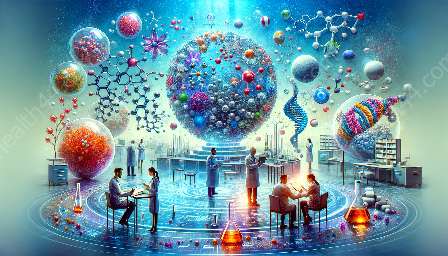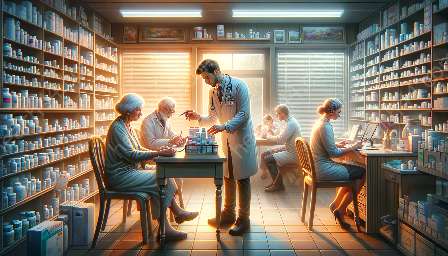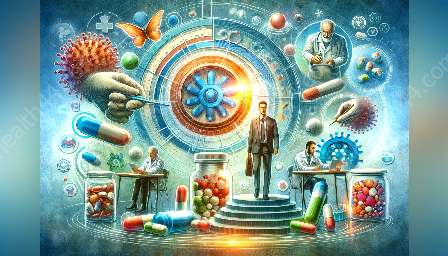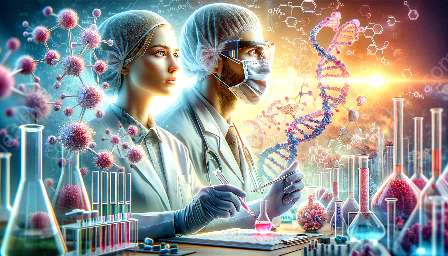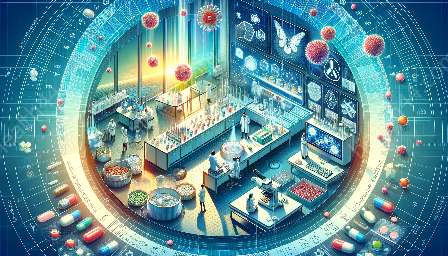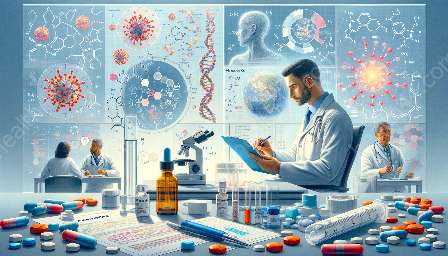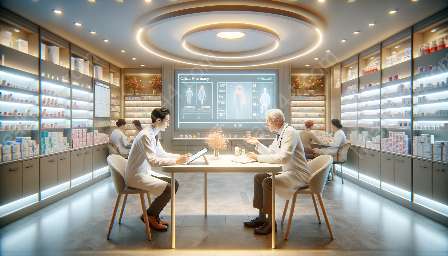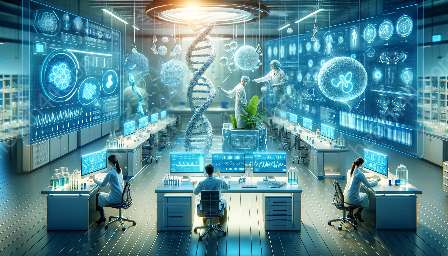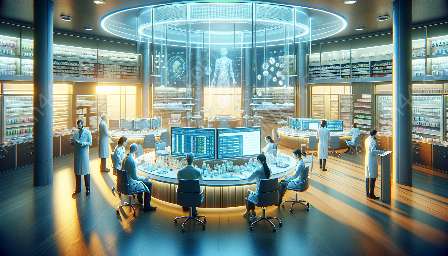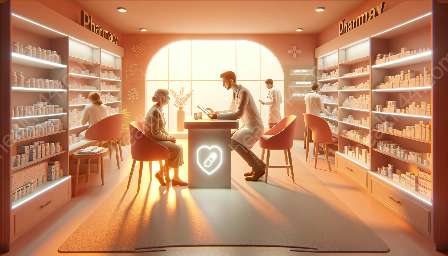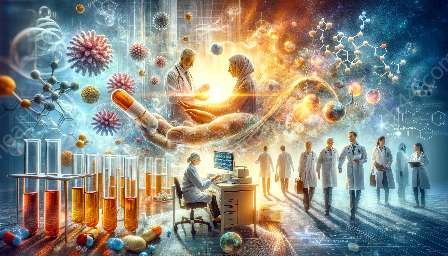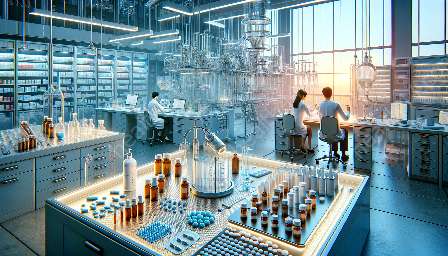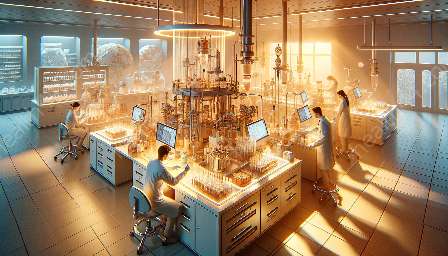Drug development and discovery is a complex and dynamic field that intersects with pharmacy and health, significantly impacting patient care and well-being.
The Process of Drug Development and Discovery
Drug development begins with extensive research to identify potential compounds or biological targets that could address specific diseases or conditions. This phase involves multidisciplinary teams of scientists, including chemists, biologists, and pharmacologists, who collaborate to investigate the mechanisms of various diseases and develop potential treatments.
Once promising compounds or targets are identified, the drug discovery phase commences. This stage involves the design, synthesis, and testing of potential drug candidates to determine their safety, efficacy, and bioavailability. Advanced technologies, such as high-throughput screening and computational modeling, play pivotal roles in accelerating the drug discovery process.
Preclinical Development and Testing
Following the discovery phase, potential drug candidates undergo rigorous preclinical testing to evaluate their pharmacokinetics, toxicity profiles, and mechanisms of action. These studies provide crucial insights into the safety and potential therapeutic effects of the candidate drugs, guiding the selection of promising candidates for further development.
Clinical Trials: Bringing Promising Drugs to Patients
Successful drug candidates move into clinical trials, a critical phase that involves testing the drugs on human subjects to assess their safety and efficacy. Clinical trials are typically conducted in multiple phases, each designed to gather specific data on the drug's safety, dosage, and effectiveness in treating the targeted disease or condition. Pharmacists often play integral roles in the clinical trial process, ensuring proper drug dispensing, monitoring patient outcomes, and addressing potential drug interactions or adverse effects.
Regulatory Approval and Market Access
Upon successful completion of clinical trials, the drug undergoes an extensive regulatory review by health authorities, such as the Food and Drug Administration (FDA) in the United States or the European Medicines Agency (EMA) in the European Union. Regulatory agencies assess the clinical data, manufacturing processes, and safety profiles of the drug to determine if it meets the stringent requirements for approval. Once approved, the drug can be marketed and made accessible to patients, offering new therapeutic options and hope for those in need.
The Role of Pharmacists in Drug Development and Patient Care
Pharmacists are pivotal figures in the journey of drug development and discovery. Their expertise in pharmacology, medication management, and patient care enables them to contribute significantly to various stages of the drug development process and play a crucial role in delivering safe and effective medications to patients.
Research and Development
In the research and development phase, pharmacists collaborate with multidisciplinary teams, providing insights into drug mechanisms, dosage forms, and potential therapeutic uses. Their knowledge of pharmacokinetics and pharmacodynamics is invaluable in optimizing drug safety and efficacy profiles.
Clinical Trials and Patient Care
During clinical trials, pharmacists ensure the safe dispensing and administration of investigational drugs to study participants. They play critical roles in monitoring patients for adverse effects, drug interactions, and therapeutic responses, contributing to the generation of high-quality clinical data that informs drug approval decisions.
Patient Education and Medication Management
Upon drug approval, pharmacists continue to be integral in patient care by providing medication counseling, ensuring proper medication adherence, and monitoring patient outcomes. Their expertise in drug interactions, side effect management, and individualized dosing regimens contributes to the safe and effective use of newly approved medications.
Advancing Healthcare and Innovation
Pharmacists actively participate in advancing healthcare by engaging in research, promoting medication safety initiatives, and collaborating with healthcare teams to optimize patient outcomes. Their dedication to continuous learning and staying updated on new medications and therapeutic approaches underscores their essential role in drug development and patient care.
The Impact of Drug Development and Discovery on Health
The impact of drug development and discovery extends far beyond the realm of pharmaceutical research. By delivering innovative and effective medications, this field contributes to improved health outcomes, enhanced quality of life for patients, and the overall advancement of healthcare.
Addressing Unmet Medical Needs
Drug development and discovery endeavors target unmet medical needs, seeking to provide solutions for diseases and conditions that currently lack effective treatment options. From rare diseases to complex conditions, the pursuit of new drugs offers hope for patients who have limited therapeutic alternatives.
Preventive and Therapeutic Benefits
Newly developed medications contribute to preventive and therapeutic interventions, enabling healthcare providers to more effectively manage chronic diseases, prevent complications, and improve patient adherence to treatment regimens. Vaccines, novel drug classes, and targeted therapies exemplify the diversity of innovations stemming from drug development efforts.
Economic and Societal Impact
The successful introduction of innovative drugs stimulates economic growth, fosters scientific innovation, and generates employment opportunities within the pharmaceutical industry. Additionally, improved health outcomes lead to reduced healthcare costs and a healthier workforce, ultimately benefiting society at large.
Challenges and Opportunities in Drug Development
While drug development and discovery yield remarkable achievements, the process is not without challenges. Research costs, regulatory complexities, and the intricacies of clinical trials present significant hurdles. However, with advancements in technology, collaborative research initiatives, and a renewed focus on personalized medicine, the future holds promising opportunities to overcome these challenges and deliver life-changing medications to those in need.
Personalized Medicine and Precision Therapeutics
Emerging trends in drug development emphasize personalized medicine, tailoring treatments to individual genetic, environmental, and lifestyle factors. Pharmacogenomics, biomarker-driven therapies, and targeted drug delivery systems offer new avenues to optimize treatment outcomes while minimizing adverse effects.
Technological Innovations
Technological advancements, such as artificial intelligence, machine learning, and genomics, are revolutionizing drug discovery and development. These cutting-edge tools enable more efficient screening of potential drug candidates, predictive modeling of drug response, and the identification of novel therapeutic targets, ultimately accelerating the pace of innovation.
Collaborative Research and Global Health Initiatives
Collaborative efforts among pharmaceutical companies, academic institutions, and international health organizations are fostering a collective approach to addressing global health challenges. Initiatives focused on neglected diseases, antimicrobial resistance, and public health crises are shaping a collaborative landscape that transcends geographical boundaries in pursuit of transformative drug discoveries.
Concluding Thoughts
Drug development and discovery epitomize the relentless pursuit of scientific innovation, with profound implications for pharmacy and health. By unraveling the complexities of diseases, forging novel therapeutic pathways, and empowering pharmacists to deliver cutting-edge healthcare solutions, this captivating field continues to shape the landscape of modern medicine and holds the promise of transforming patient care for generations to come.


